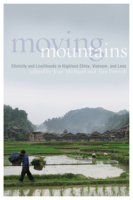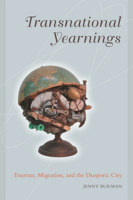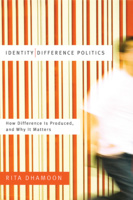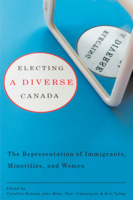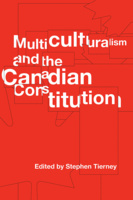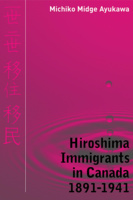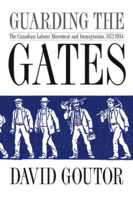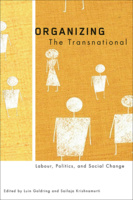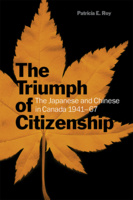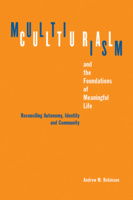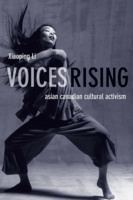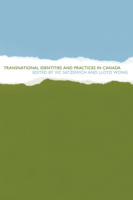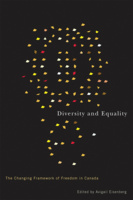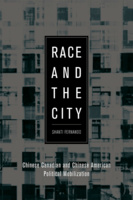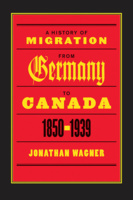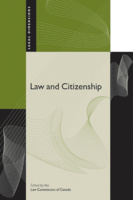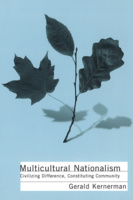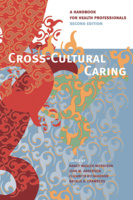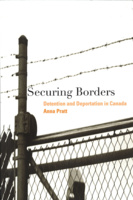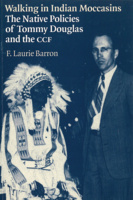The Way of the Bachelor
Early Chinese Settlement in Manitoba
This book documents the religious beliefs and cultural practices that helped sustain and lend meaning to Chinese bachelors in smaller towns and cities of Manitoba.
Moving Mountains
Ethnicity and Livelihoods in Highland China, Vietnam, and Laos
This collection argues that minorities in the Southeast Asian Massif are not powerless in the face of economic and political change in the region – they are drawing on ethnicity and culture to indigenize modernity and maintain their livelihoods.
Dreaming in Canadian
South Asian Youth, Bollywood, and Belonging
Dreaming in Canadian explores the connections between the media and identity formation among young Canadians of South Asian origin.
Transnational Yearnings
Tourism, Migration, and the Diasporic City
By exploring circuits of migration and personal exchange between Toronto and Jamaica, this book maps a new way to look at postcolonial contact zones and transnational migration.
Identity/Difference Politics
How Difference Is Produced, and Why It Matters
Identity/Difference Politics offers a new direction for the study of identity/difference, one that moves beyond liberal multiculturalism’s preoccupation with culture.
White But Not Equal
Check out "A Class Apart" - the new PBS American Experience documentary that explores this historic case! In 1952 in Edna, Texas, Pete Hernández, a twenty-one-year-old cotton picker, got into a fight with several men and was dragged from a tavern, robbed, and beaten. Upon ...
Electing a Diverse Canada
The Representation of Immigrants, Minorities, and Women
Covering eleven cities as well as Canada’s Parliament, this book presents the most extensive analysis to date of the electoral representation of immigrants, minorities, and women in Canada.
Multiculturalism and the Canadian Constitution
The essays illustrate how deeply multiculturalism is woven into the fabric of the Canadian constitution and the everyday lives of Canadians.
A Zapotec Natural History
A Zapotec Natural History is an extraordinary book and accompanying CD (also avialble on the web here!) that describe the people of a small town in Mexico and their remarkable knowledge of the natural world in which they live. San Juan Gbëë is a Zapotec Indian ...
Guarding the Gates
The Canadian Labour Movement and Immigration, 1872-1934
A pioneering study of Canadian labour leaders’ approach to immigration from the 1870s to the Great Depression.
Organizing the Transnational
Labour, Politics, and Social Change
This collection articulates a multi-level cultural politics of transnationalism to frame contemporary analyses of immigration and diasporas.
Chinatowns
Towns within Cities in Canada
From instant Chinatowns in gold- and coal-mining communities to new Chinatowns which have sprung up in city neighbourhoods and suburbs since World War II, this is definitive history of Chinatowns in Canada.
The Triumph of Citizenship
The Japanese and Chinese in Canada, 1941-67
This final volume to Patricia E. Roy's pivotal trilogy exploring racial discrimination against Chinese- and Japanese-Canadians examines the removal of all Japanese-Canadians from the BC coast during WWII, while Chinese-Canadians gained the right to vote in 1947.
Multiculturalism and the Foundations of Meaningful Life
Reconciling Automony, Identity, and Community
Theories of liberal multiculturalism seek to reconcile cultural rights with universal liberal principles. Some focus on individual autonomy; others emphasize communal identity. Andrew Robinson argues that liberal multiculturalism can be justified without privileging either ...
Voices Rising
Asian Canadian Cultural Activism
Examines Asian Canadian political and cultural activism around community building, identity making, racial equity, and social justice.
Transnational Identities and Practices in Canada
This is the first collection in Canada to provide a comprehensive and interdisciplinary examination of transnationalism.
Diversity and Equality
The Changing Framework of Freedom in Canada
Critically examines the challenge of protecting rights in diverse societies.
Race and the City
Chinese Canadian and Chinese American Political Mobilization
Presents an elegant analysis of the mechanisms of political mobilization under systemic racism that draws on case studies, interviews, and a detailed understanding of the racialized legal and sociocultural histories of the United States and Canada.
Women and Change at the U.S.--Mexico Border
There's no denying that the U.S.-Mexico border region has changed in the past twenty years. With the emergence of the North American Free Trade Agreement (NAFTA), the curtailment of welfare programs, and more aggressive efforts by the United States to seal the border against undocumented migrants, the prospect of seeking a livelihood--...
A History of Migration from Germany to Canada, 1850-1939
Considers why Germans left their home country, why they chose to settle in Canada, who assisted their passage, and how they crossed the ocean to their new home, as well as how the Canadian government perceived and solicited them as immigrants.
Law and Citizenship
The essays this volume provide a framework for analyzing citizenship in an increasingly globalized world by addressing a number of fundamental questions.
Multicultural Nationalism
Civilizing Difference, Constituting Community
Canada's national question is self-defeating: attempts to constitute a Canadian political community generate polarizing and depoliticizing deliberations.
Cross-Cultural Caring, 2nd ed.
A Handbook for Health Professionals
This new edition provides up-to-date statistics and fresh analysis of changing trends in immigration, describes ethno-cultural community, discussing such issues as childbirth, mental illness, dental care, hospitalization, and death, as well as home country culture, common reasons for emigrating, and challenges in adjusting to a new culture.
Securing Borders
Detention and Deportation in Canada
A close look at the laws, policies, and practices of detention and deportation in Canada since the Second World War.
The Oriental Question
Consolidating a White Man's Province, 1914-41
Patricia E. Roy continues her study into why British Columbians were historically so opposed to Asian immigration.
Mexican Americans and Health
By the middle of the twenty-first century, one out of every six Americans will be of Mexican descent; and as health care becomes of increasing concern to all Americans, the particular needs of Mexican Americans will have to be more thoroughly addressed.
Mexican Americans and Health explains how the health of Mexican-...
Tunnel Kids
Winner of the Southwest Book Award! Beneath the streets of the U.S.-Mexico border, children are coming of age. They have come from all over Mexico to find shelter and adventure in the drainage tunnels that connect the twin cities of Nogales, Sonora, and Nogales, Arizona. This book opens up the world of the tunnel kids and tells how in this murky underworld of struggling immigrants, drug dealers, and thieves, these kids have carved out a place of their own.
Two parallel tunnels each fourteen feet wide and several miles long drain the summer rains from Mexico to the United States. Here and in the crumbling colonias you'll meet the tunnel kids: streetwise El Boston, a six-year veteran of the tunnels; his little pal Jesús; Jesús' girlfriend, La Flor, and her six-month-old baby; wild Negra; poetic Guanatos; moody Romel and his beautiful girlfriend, La Fanta. They form an extended family of some two dozen young people who live hard-edged lives and answer to no one in El Barrio Libre the free barrio.
Lawrence Taylor and Maeve Hickey met these kids at Mi Nueva Casa, the safe house built to draw the youths out of the tunnels and into a more normal life. The authors spent two summers with tunnel kids as they roamed all over Nogales and beyond in their struggle to survive. In the course of their adventures the kids described their lives, talking about what might tempt them to leave the tunnels and what kept them there.
Hickey's stunning portraits provide a heart-stopping counterpoint to Taylor's incisive prose. Story and photos together open a window into the life of the tunnel kidsa world like that of many homeless children, precarious and adaptive, albeit unique to the border. Where most people might see just another gang of doped-up, violent children, Taylor and Hickey discover displaced and sometimes heroic young people whose stories add a human dimension to the world of the U.S.-Mexico border.
In/visible Sight
The Mixed-Descent Families of Southern New Zealand
Drawing on the experiences of mixed-Maori/White families, Wanhalla examines the early history of southern New Zealand, a world in which inter-racial intimacy played a formative role.
The Chaco Mission Frontier
Spanish missions in the New World usually pacified sedentary peoples accustomed to the agricultural mode of mission life, prompting many scholars to generalize about mission history. James Saeger now reconsiders the effectiveness of the missions by examining how Guaycuruan peoples of South America's Gran Chaco adapted to them during ...
Lives on the Line
Straddling an international border, the twin cities of Nogales, Arizona, and Nogales, Sonora, are in many ways one community. For years the border was less distinct, with Mexicans crossing one way to visit family and friends and tourists crossing the other to roam the curio shops. But as times change, so do places like Nogales. The maquiladora industry has brought jobs, population growth, and environmental degradation to the Mexican side. A crackdown against undocumented immigrants has brought hundreds of Border Patrol agents and a 14-foot-tall steel wall to the U.S. side. Drug smuggling has brought violence to both sides. Neither Nogales will ever be the same.
In Lives on the Line, Miriam Davidson tells five true stories from these border cities to show the real-life effects that the maquiladora boom and the law enforcement crackdown have had on the people of "Ambos (Both) Nogales." Readers will meet Yolanda Sánchez, a single mother who came to work in the factories; Jimmy Teyechea, a cancer victim who became an outspoken environmental activist; Dario Miranda Valenzuela, an undocumented immigrant who was shot and killed by a U.S. Border Patrol agent; Cristina, a "tunnel kid" who aspired to flee the gang lifestyle; and Hope Torres and Tom Higgins, maquiladora managers who have made unique contributions to the community.
In sharing these stories of people transformed by love and faith, by pain and loss, Davidson relates their experiences to larger issues and shows that, although life on the border is tough, it is not without hope.
Lives on the Line is an impassioned look at the changes that have swept the U.S.-Mexico border: the rising tension concerning free trade and militarization, the growing disparity between the affluent and the impoverished. At the same time, the book highlights the positive aspects of change, revealing challenges and opportunities not only for the people who live on the border but for all Americans.
Walking in Indian Moccasins
The Native Policies of Tommy Douglas and the CCF
This landmark study examines the Tommy Douglas's Co-operative Commonwealth Federation government - the first socialist government in North America - and the development of policies aimed at Indian and Metis people in the post-war period.
Hungarian Rhapsodies
Essays on Ethnicity, Identity, and Culture
From an examination of photographer Andre Kertesz to a visit to a Hungarian-American church in Cleveland, Richard Teleky reconciles contemporary identity with a heritage from another country.
Perspectives in Mexican American Studies, Volume 5
Although Chicano scholarship has grown significantly, research on women of Mexican descent remains sparse. This issue of Perspectives is devoted to Mexican American women, and examines the reasons of the lack of published scholarship as well as new directions and paradigms for research.
This compilation of articles and essays on Chicanas reflects the continuing effort to provide a corrective to the traditional works and models that have obscured the roles and experiences of women. Readers will find them thoughtful, instructive, and provocative.
Contents Beyond Machismo, La Familia, and Ladies Auxiliaries: A Historiography of Mexican-Origin Women's Participation in Voluntary Associations and Politics in the United States, 1870-1990, by Cynthia E. Orozco Beyond the Adelita Image: Women Scholars in the National Association for Chicano Studies, 1972-1992, by Gilberto Garc¡a "Faithful Hard-Working Mexican Hands": Mexicana Workers During the Great Depression, by Yolanda Ch vez Leyva Midwestern Mexican American Women and the Struggle for Gender Equality: A Historical Overview, 1920s-1960s, by Richard Santill Cooperative Re/Weavings: Astistic Expression and the Economic Development in a Northern New Mexican Village, by Mar¡a Ochoa Deconstructing the Corrido Hero: Caballero and Its Gendered Critique of Nationalist Discourse, by Mar¡a Cotera The Rearguarders Thesis and Latina Elites: A Case Study, by Isidro D. Ortiz
Answered Prayers
When Catholics in the Southwest ask God or a saint for help, many of them do not merely pray. They also promise or present a gifta tiny metal object known as a milagro. A milagro, which means "miracle" in Spanish, depicts the object for which a miracle is sought, such as a crippled leg or a new house. Milagros are offered for ...
Women of the Mexican Countryside, 1850-1990
Too often in the history of Mexico, women have been portrayed as marginal figures rather than legitimate participants in social processes. As the twentieth century draws to a close, Mexican women of the countryside can be seen as true historical actors: mothers and heads of households, factory and field workers, community activists, artisans, and merchants. In this new book, thirteen contributions by historians, anthropologists, and sociologists--from Mexico as well as the United States--elucidate the roles of women and changing gender relations in Mexico as rural families negotiated the transition from an agrarian to an industrial society.
Drawing on Mexican community studies, gender studies, and rural studies, these essays overturn the stereotypes of Mexican peasant women by exploring the complexity of their lives and roles and examining how these have changed over time. The book emphasizes the active roles of women in the periods of civil war, 1854-76, and the commercialization of agriculture, 1880-1910. It highlights their vigorous responses to the violence of revolution, their increased mobility, and their interaction with state reforms in the period from 1910 to 1940. The final essays focus on changing gender relations in the countryside under the impact of rapid urbanization and industrialization since 1940.
Because histories of Latin American women have heretofore neglected rural areas, this volume will serve as a touchstone for all who would better understand women's lives in a region of increasing international economic importance. Women of the Mexican Countryside demonstrates that, contrary to the peasant stereotype, these women have accepted complex roles to meet constantly changing situations.
CONTENTS
IWomen and Agriculture in Nineteenth-Century Mexico
1. Exploring the Origins of Democratic Patriarchy in Mexico: Gender and Popular Resistance in the Puebla Highlands, 1850-1876, Florencia Mallon
2. "Cheaper Than Machines": Women and Agriculture in Porfirian Oaxaca (1880-1911), Francie R. Chassen-López
3. Gender, Work, and Coffee in C¢rdoba, Veracruz, 1850-1910, Heather Fowler-Salamini
4. Gender, Bridewealth, and Marriage: Social Reproduction of Peons on Henequen Haciendas in Yucatán (1870-1901), Piedad Peniche Rivero
IIRural Women and Revolution in Mexico
5. The Soldadera in the Mexican Revolution: War and Men's Illusions, Elizabeth Salas
6. Rural Women's Literacy and Education During the Mexican Revolution: Subverting a Patriarchal Event?, Mary Kay Vaughan
7. Doña Zeferina Barreto: Biographical Sketch of an Indian Woman from the State of Morelos, Judith Friedlander
8. Seasons, Seeds, and Souls: Mexican Women Gardening in the American Mesilla (1900-1940), Raquel Rubio Goldsmith
IIIRural Women, Urbanization, and Gender Relations
9. Three Microhistories of Women's Work in Rural Mexico, Patricia Arias
10. Intergenerational and Gender Relations in the Transition from a Peasant Economy to a Diversified Economy, Soledad González Montes
11. From Metate to Despate: Rural Women's Salaried Labor and the Redefinition of Gendered Spaces and Roles, Gail Mummert
12. Changes in Rural Society and Domestic Labor in Atlixco, Puebla (1940-1990), Maria da Glória Marroni de Velázquez
13. Antagonisms of Gender and Class in Morelos, Mexico, JoAnn Martin


